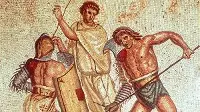Slavery in Ancient Rome
Slavery existed in ancient Eastern civilizations as well. In these societies, however, slave numbers were not significant, as they were in Greece and certainly in Rome. Greece and Rome directed slaves to do a great many things: run households, make food, make wine, run shops, serve in the military, build roads and bridges and aqueducts. During the Classical Period in Athens, a full one-third of the population were slaves. Most Athenians owned at least one slave. The number was even higher overall in the Roman civilization. These two civilizations made slave labor a huge part of the workforce. And why not? It was cheap. Slaves in Rome were foreigners, certainly, but they were also non-immigrants, people who were NOT born Greek or born Roman. A person could be enslaved for all sorts of reasons, including being captured in battle or in a raid or being so far in debt that you had no other hope of paying it off. 
Roman slaves were, in large part, prisoners of war or just plain prisoners. Rome did have a fair number of laws, and sometimes the punishment for breaking a law was to be enslaved. For most of the entirety of the Roman Republic, slaves were prisoners of war. Rome was fighting a lot of wars during this period, and winning most of them, and so they had a steady supply of slaves to do all of that road-building and temple construction and such. But as much as the Romans celebrated the Pax Romana, the 200 years of peace that roughly coincided with the introduction of the Empire, that peace didn't bring in a whole lot of prisoners of war and so the Roman pipeline had to shift its focus a bit in order to maintain the steady supply of slaves. It was at this time that more and more prisoners were made into slaves. It was common practice at this time that children of slaves were slaves from birth. Rome didn't make a concerted effort to produce more children of slaves, but a source of slaves is a source of slaves. Also, a person could sell himself into slavery, in order to pay off debts. Rome had public slaves and private slaves and used them for all kinds of purposes: Roman slaves were clerks, secretaries, even tax agents. They dug graves and mined gold and silver. They ran households and massive Roman gardens. Gladiators were slaves, too. 
Roman masters had total control over the lives (and deaths) of their slaves. Roman masters who killed their slaves (or anyone else's slaves) would not be punished. If one master killed the slave of another master, the aggrieved might demand compensation, in the form of money or another slave; but no law prohibited the killing of a slave. Harming (but not killing) a slave of another master could generate legal or economic problems for a Roman master. Compensation would be in money or things or, perhaps, in another slave as redress. The one right that Roman slaves seemed to have had with relative impunity was in the area of religion. Slaves could worship their own god or gods. Roman slaves had a right to be buried according to the strictures of their religions. This was in line with the multicultural approach toward religion that Roman rulers took until the Christian conversion of Constantine. Even after that, when Christianity was the state religion, Roman masters did not actively interfere on a large scale with their slaves' religious practices. Slaves couldn't marry one another, of course, but they could practice their own faith in their own way, by and large. Slaves had no property because they were property themselves. They could, however, in Greek and Roman times, save a little money. They couldn't spend it, but they could save it. The Greeks didn't have a word for this, but the Romans did: they called it a "peculium." The moment the peculium was worth more than the slave, that slave could buy his way out of slavery. Slaves were traded in ancient civilizations. They might be traded slave for slave or slave for money or slave for goods. Some merchants set up shop as slave traders, certainly in Rome. |
|
Social Studies for Kids
copyright 2002–2024
David White




